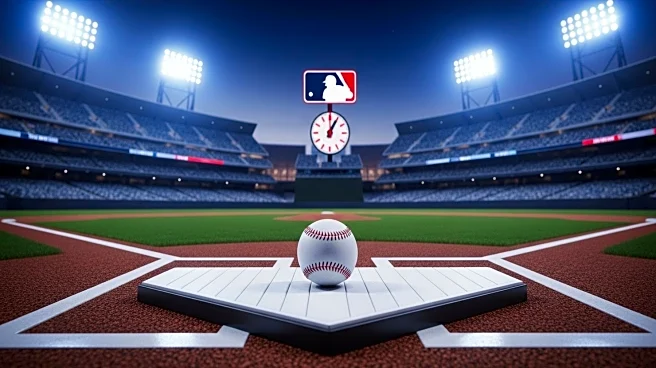What is the story about?
What's Happening?
Major League Baseball (MLB) has introduced a series of reforms aimed at revitalizing the sport and increasing game attendance, which has been declining over the years. The most significant change is the implementation of a 'pitch clock,' requiring pitchers to deliver the ball within 15 seconds. This rule was introduced in 2023 to address the slow pace of games, which had become a major concern for fans and stakeholders. The pitch clock has successfully reduced game duration by approximately half an hour compared to previous years. These changes are part of a broader effort to generate more offense and eliminate dead time, making the game more engaging for fans. The reforms come in response to a significant drop in annual game attendance, which fell from 79.5 million in 2007 to 64.5 million in 2022.
Why It's Important?
The introduction of the pitch clock and other reforms is crucial for MLB as it seeks to regain its position as America's favorite pastime. The decline in attendance and interest in baseball has been attributed to the slow pace of games, which often exceed three hours. By speeding up the game, MLB aims to attract a younger audience with shorter attention spans and compete with other sports and entertainment options. The reforms are expected to increase engagement and viewership, potentially reversing the trend of declining attendance. This move is also significant for the economic stakeholders involved, including teams, sponsors, and broadcasters, who rely on high attendance and viewership for revenue.
What's Next?
MLB will continue to monitor the impact of the pitch clock and other reforms on game attendance and fan engagement. The league may consider additional changes or adjustments based on feedback from fans, players, and other stakeholders. There is potential for further innovations to make the game more appealing to diverse demographic groups, including younger fans. MLB's success in revitalizing the sport could influence other leagues facing similar challenges with audience engagement.
Beyond the Headlines
The reforms highlight a cultural shift within baseball, as traditionalists and modernists debate the balance between preserving the game's heritage and adapting to contemporary demands. The introduction of the pitch clock reflects a broader trend in sports to enhance the viewing experience and cater to changing consumer preferences. This development may also spark discussions about the role of analytics and data in sports, as MLB seeks to maintain the human element while embracing technological advancements.
















